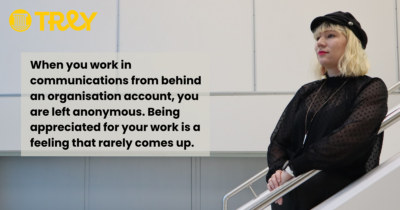The year 2020 has been characterised by the continuous need for crisis communication. At the start of the year, I had the idea of practicing crisis communication with my board members each month, as it is a skill which needs to be updated and honed all the time. In late-Winter we were thrown into the deep end, however, as the coronavirus brought society into a halt, and kickstarted the neverending period of crisis communication at TREY. No time for practice, now it was battle stations!
Crisis communication is communication done by organisations in exceptional circumstances where the safety or reputation of the community is threatened. Before this peculiar year, I only had experience in crisis communication regarding the reputation aspect of things, but 2020 has taught me much about crisis communication which deals with people’s health and safety. Constantly refreshing the intranet site and drafting communications from the coronavirus bulletins has become a daily task, on top of all the existing daily tasks.
The timing and careful wording of messages are key in crisis communication. Therefore it takes priority over other tasks. At the Student Union, we establish our own channels for the crisis communication team, and its founding always changes the course of a work day or even the whole week.
I enjoy the dialogue we have with the members of our community, and crisis communication often presents the opportunity to discuss matters with them and to develop our own actions. It is never easy, though, and sometimes it takes a legion of people and some time to formulate one tweet. Words are powerful, so choosing them is a delicate business. I hope that everyone would remember that there is a person behind that organisation account who is simply doing their job. I have received a couple of messages where the sender apologised for the tone in their message to TREY’s account, as they had no idea I was behind that. It should never be up to personal relationships or acquaintances how we treat the people behind organisation accounts, however. After all, we are all aiming for the same: A better today and tomorrow for all students. Through constructive feedback we can reach for it together.

When you work in communications from behind an organisation account, you are left anonymous. Being appreciated for your work is a feeling that rarely comes up. For that reason, one of the most important moments of the year for me was when the outgoing Chair of the Council Adam thanked the communications sector first in their speech during the last meeting of the Council. We have truly done great work and continuous crisis communication on top of that! I am proud of my own work and what we have achieved with Aleksi and Ville, be it with TREY News, crisis communication or our daily communications tasks. Many others in our office have worked with crisis communication, as well; our Specialist in Social Affairs Laura has been such a lifesaver for me. Thank you!
With pride and excitement to a new year!